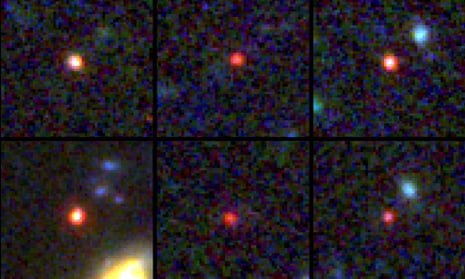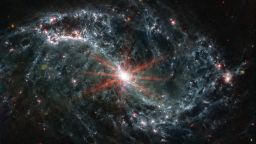If I don't have an answer or explanation for how something happened, that does not release anyone else from the obligation to demonstrate why their explanation is valid. You cannot say "you can't explain this, so my guess must be accepted." Not if you value knowledge and learning and actual truth.
My Prediction Regarding New Space Telescope That Will See Back to 100 Million Years From the Big Bang
by Sea Breeze 141 Replies latest watchtower beliefs
-
-
waton
Thanks for adding a ‘shifting the burden of proof’ fallacy.
You are welcome. every time an ingenious device is created, the fact about the whole shebang being created out of uncreated energy, even with a big bang, gets more firmly confirmed.
-
waton
University of Colorado at Boulder. "James Webb spots super old, massive galaxies that shouldn't exist." ScienceDaily. ScienceDaily, 22 February 2023. <www.sciencedaily.com/releases/2023/02/230222115828.htm>.
from The Guardian science:
-
Disillusioned JW
Last night on television on PBS I saw a science program about the James Webb telescope. It was a very good and very informative show. It said some things which I think Sea Breeze would appreciate.
-
Disillusioned JW
The science show I referred to in m prior post was an episode of NOVA called "New Eye on the Universe". The show said that what the James Webb telescope revealed about the early universe was very unexpected (according to the current scientific models used to model the very early universe) and thus indicated that some of the particular current scientific models (the ones used to model the very early universe) are in error and need to be revised. However I think this indicates that the universe is much older than most astrophysicists believe, and thus supports the idea that universe has always existed and that there never was any big bang of a cosmic singularity. I have never been convinced that our universe was once a cosmic singularity, though upon learning of details of the big bang I started believing that out universe started out with a volume smaller than that of an individual atom. There are some scientists, based upon scientific reasons, who say our universe has always existed and that there was never a big bang which made our universe.
In my locality the the science episode will repeat in a few hours after the time of the submission of this post. I intend to watch the show when it repeats and I hope to make notes of what it says.
On page 11 of this topic thread Sea Breeze said the following in a reply to me and Anony Mous. "The BB theory has a history of failed predictions and only explains about 5% of the universe according to its own theory". Recently I found a scientific news article about a scientist saying that black holes create dark energy. See https://www.space.com/black-holes-create-dark-energy-first-evidence and https://www.newscientist.com/article/2359827-dark-energy-may-have-been-hiding-in-the-cores-of-black-holes-all-along/ .
-
Disillusioned JW
Yesterday I found the science article located at https://www.sciencedaily.com/releases/2023/02/230222115828.htm which is called "James Webb spots super old, massive galaxies that shouldn't exist". The article is dated February 22, 2023 (the same day I found it.) A summary of it says the following. "A team of international researchers have identified six candidate galaxies that existed roughly 500 to 700 million years after the Big Bang and are about as big as the modern Milky Way Galaxy -- a feat that scientists didn't think was possible." The article says in part the following.
'Each of the candidate galaxies may have existed at the dawn of the universe roughly 500 to 700 million years after the Big Bang, or more than 13 billion years ago. They’re also gigantic, containing almost as many stars as the modern-day Milky Way Galaxy.
“It’s bananas,” said Erica Nelson, co-author of the new research and assistant professor of astrophysics at the University of Colorado Boulder. “You just don’t expect the early universe to be able to organize itself that quickly. These galaxies should not have had time to form.”
Nelson and her colleagues, including first author Ivo Labbé of the Swinburne University of Technology in Australia, published their results Feb. 22 in the journal Nature.The latest finds aren’t the earliest galaxies observed by James Webb, which launched in December 2021 and is the most powerful telescope ever sent into space. Last year, another team of scientists spotted four galaxies that likely coalesced from gas around 350 million years after the Big Bang. Those objects, however, were downright shrimpy compared to the new galaxies, containing many times less mass from stars.
... These primordial galaxies, however, probably didn’t have much in common with our own.
“The Milky Way forms about one to two new star every year,” Nelson said. “Some of these galaxies would have to be forming hundreds of new stars a year for the entire history of the universe.”
Nelson and her colleagues want to use James Webb to collect a lot more information about these mysterious objects, but they’ve seen enough already to pique their curiosity. For a start, calculations suggest there shouldn’t have been enough normal matter—the kind that makes up planets and human bodies—at that time to form so many stars so quickly.
“If even one of these galaxies is real, it will push against the limits of our understanding of cosmology,” Nelson said.'
To me this evidence supports the idea that the universe is much older than what the Big Bang theory says and even that universe (in some form) has always existed, and thus supports the idea that no deity created the universe, and thus it supports scientific naturalism. Regarding the idea that the universe possibly had no beginning see the science article called "What if the universe had no beginning? ". It says in part the following.
'Perhaps our universe has always existed — and a new theory of quantum gravity reveals how that could work.
"Reality has so many things that most people would associate with sci-fi or even fantasy," said Bruno Bento, a physicist who studies the nature of time at the University of Liverpool in the U.K.
In his work, he employed a new theory of quantum gravity, called causal set theory, in which space and time are broken down into discrete chunks of space-time. At some level, there's a fundamental unit of space-time, according to this theory.
Bento and his collaborators used this causal-set approach to explore the beginning of the universe. They found that it's possible that the universe had no beginning — that it has always existed into the infinite past and only recently evolved into what we call the Big Bang.
... General relativity, on the other hand, is the most powerful and complete description of gravity ever devised.
But for all its strengths, general relativity is incomplete. In at least two specific places in the universe, the math of general relativity simply breaks down, failing to produce reliable results: in the centers of black holes and at the beginning of the universe. These regions are called "singularities," which are spots in space-time where our current laws of physics crumble, and they are mathematical warning signs that the theory of general relativity is tripping over itself. Within both of these singularities, gravity becomes incredibly strong at very tiny length scales.
As such, to solve the mysteries of the singularities, physicists need a microscopic description of strong gravity, also called a quantum theory of gravity.
... causal set theory, reimagines space-time as a series of discrete chunks, or space-time "atoms." This theory would place strict limits on how close events can be in space and time, since they can't be any closer than the size of the "atom."
... "A huge part of the causal set philosophy is that the passage of time is something physical, that it should not be attributed to some emergent sort of illusion or to something that happens inside our brains that makes us think time passes; this passing is, in itself, a manifestation of the physical theory," Bento said. "So, in causal set theory, a causal set will grow one 'atom' at a time and get bigger and bigger."
The causal set approach neatly removes the problem of the Big Bang singularity because, in the theory, singularities can't exist. It's impossible for matter to compress down to infinitely tiny points — they can get no smaller than the size of a space-time atom.
... In our work instead, there would be no Big Bang as a beginning, as the causal set would be infinite to the past, and so there's always something before."
Their work implies that the universe may have had no beginning — that it has simply always existed. What we perceive as the Big Bang may have been just a particular moment in the evolution of this always-existing causal set, not a true beginning.'
-
Sea Breeze
The James Webb Space Telescope continues to support a Creation model
Webb Telescope Makes a Surprising Galactic Discovery in the Distant Universe
“These objects are way more massive than anyone expected,” said study coauthor Joel Leja, assistant professor of astronomy and astrophysics at Penn State University, in a statement. “We expected only to find tiny, young, baby galaxies at this point in time, but we’ve discovered galaxies as mature as our own in what was previously understood to be the dawn of the universe.”
The telescope observes the universe in infrared light, which is invisible to the human eye, and is capable of detecting the faint light from ancient stars and galaxies. By peering into the distant universe, the observatory can essentially see back in time up to about 13.5 billion years ago. (Scientists have determined the universe is about 13.7 billion years old.)
“The revelation that massive galaxy formation began extremely early in the history of the universe upends what many of us had thought was settled science,” Leja said. “We’ve been informally calling these objects ‘universe breakers’ — and they have been living up to their name so far.”
The galaxies are so massive that they conflict with 99% of models representing early galaxies in the universe, which means scientists need to rethink how galaxies formed and evolved. The current theory suggests that galaxies began as small clouds of stars and dust that grew over time.
“We looked into the very early universe for the first time and had no idea what we were going to find,” Leja said. “It turns out we found something so unexpected it actually creates problems for science. It calls the whole picture of early galaxy formation into question.”
It wasn't unexpected at all for people who believe God. The OP on this thread is proof.
They know what they were expecting to find. And, all they found was evidence that support the Genesis account. That's the "problem" they are talking about. Notice how evidence that supports a created universe is described as a "problem". I thought science was about facts.
Pretty big blow to Atheists, Materialists, Old Earth Creationists, Theistic Evolutionists
-
SydBarrett
The James Webb Space Telescope continues to support a Creation model
You're one whacked out loon, for sure.
Happy July 4, though. -
Sea Breeze
@SydBarrett
You have been indoctrinated by more than just the WT. We have eyewitness testimony in Genesis that all of the stars were created in one 24 hour earth day. Based on this testimony, I accurately predicted that the JWST would find huge fully formed galaxies for as far back as they could see.... and that secular scientists would be "surprised" "astonished" "shocked" etc.
All came true just as I predicted.
My scientific prediction went against 99% of the models describing the early universe form a MoY point of view and is repeatedly proving correct. Deal with it.The Watchtower also allowed for "millions of years" cosmology. Once again the WT is proved wrong.
-
cofty
Has there ever been a more blatant example of Dunning Kruger?

